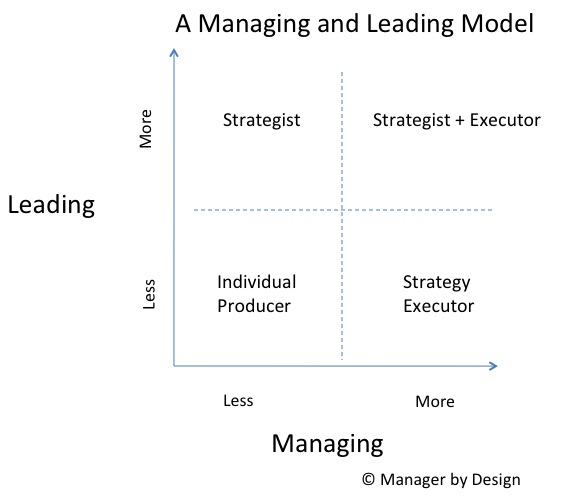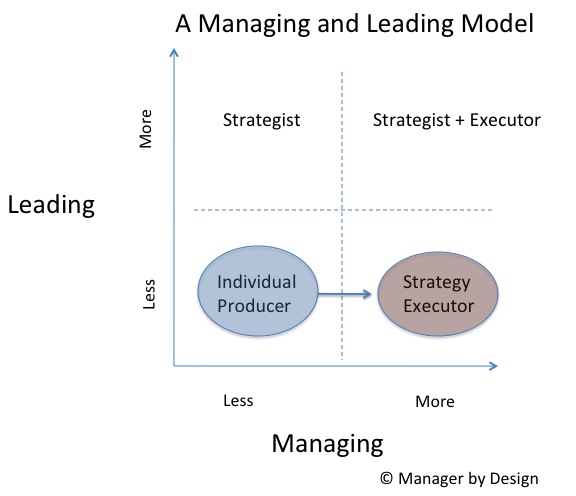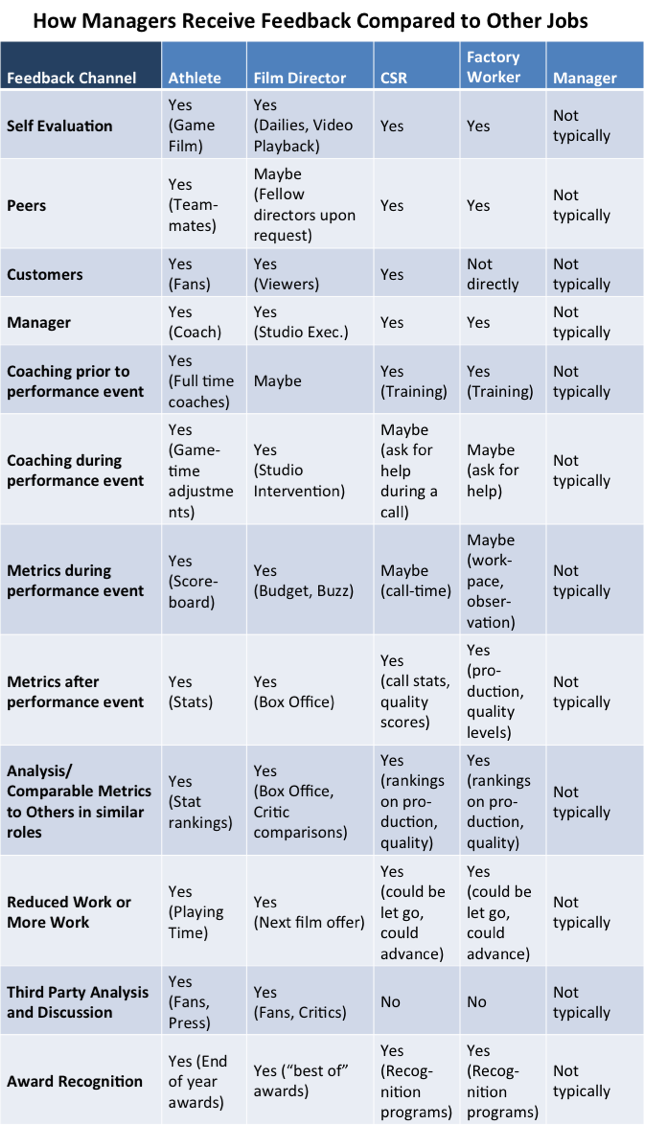Management Design: The designs we have now – Manager knows and supports only one possible strategy
In my previous article, I showed a model I created that identifies the difference between being a leader and a manager. Here it is:
In this model, the manager that I typically think of when writing about managers is in the lower right corner – a manager who is a “Strategy Executor.” The organization that the manager works for has a strategy, and the manager makes sure that this strategy is executed. This manager typically has a team of people in some capacity (either direct reports, virtual, outsourced vendor) to make sure the strategy is executed.
As an example, if you are a Training Manager, then the strategy is that the organization is using “Training” as a means to help the organization run better. “Training” is the Strategy, and the Training Manager is needed to execute that strategy.
So the training manager has to make sure the training is executed. That means there needs to be budget, a team of people and facilities to get this done somehow. That’s the manager’s job – use these resources to execute the “Training” Strategy.
But how does one become a strategy executor, a.k.a., manager? There are various paths.
The most commonly thought of path is the following:
- Someone is really good at being an individual producer, and the manager role opens up, and they get the job as the manager. That individual producer is now the strategy executor. Here’s how it looks on the model:
This seems to fit in the popular conception of how people become managers, but under this model, you can see a potential design flaw. The person becomes a manager without having been involved with the strategy development. In the case of the Training Manager, the strategy executor will be executing the “Training Strategy” without really knowing what went into the development of that strategy.
Tenets of management design: If you can’t break down a job into its tasks and workflows, find someone who can
Today I discuss a key element to managing well: Knowing what your team members are supposed to do.
This is part of a continuing series that explores the tenets of Management Design, the field this blog pioneers. Management Design is a response to the poorly performing existing designs that are currently used in creating managers. These current designs describe how managers tend to be created by accident or anointment, rather than by design.
Today’s tenet: If you can’t break down a job into its tasks and workflows, find someone who can.
Many managers are expected to manage a team of people, but really don’t have the clarity as to what the team members are expected to do. Managers often have a sense of what their customers want, and what some examples of things the team produces, or metrics that indicate success (such as sales).
But these are, for the most part, results or indicators of what the team does, not what the team does. The manager should have an understanding of what the component tasks are for the team members’ roles, and when added up, equals the thing that is produced, which then generate the metrics or impressions of success of the team.
Giving performance feedback breaks the illusion of greatness of a manager
For this article, I’d like to draw upon a concept created by Henri Wallon and popularized by French structuralist philosopher and psychoanalyst Jacques Lacan. The concept is the stade du miroir, or “the mirror stage.” The mirror stage is when an infant first sees himself in the mirror and, by virtue of seeing an image of himself, understands for the first time that he is not an embodiment of the entire universe but is instead that he is a single individual amongst many others. In short, the infant goes from thinking he’s everything to only one thing, goes from not having an identity to having an identity, and from no external image to an image of himself external to himself, and has for the first time an understanding of the other. The scope of the infant’s identity has gone from huge (or unlimited) to that of an image of himself.
OK – but this is a blog about management skills – what does this have to do with managing?
I would like to propose that – for a manager — the act of giving performance feedback is the equivalent of the mirror stage.
I have recently written about how a new manager has been stripped of her identity the moment she becomes a manager, and how that identity is often then built up using management techniques derived from individual instincts for what good techniques are. As a result, many managers persist in a kind of ongoing limbo of amateurish techniques while trying to retain the aura of expertise that they once – but no longer – have. That manager is in the difficult position of asserting that she is expert in the domain they were a former individual contributor (IC) while simultaneously asserting that she is an expert in the managerial tasks related to overseeing that IC work.
Now, imagine a manager who never gives performance feedback to the employee. That manager is like an infant who has never seen his image in the mirror. That manager can continue to think that she is
a) Expert in the field she is managing
b) Knows more than her employees
c) She can convey what is the correct way to proceed without much effort
d) Her employees believe in 100% what she says
e) Her employee can immediately implement what she has in mind
Does this sound like any managers you know or have had in the past? This manager has not gone through the “Mirror Stage” of being a manager and confronted their limitations as a manager.
Now, imagine a manager who decides to give performance feedback to the employee.
This is the moment where the manager must test the following notions:
a) she is still an expert
b) knows more than her employee
c) the conveyance of her thoughts are 100% transmittable
d) the employee will accept 100% of what she says
e) the employee will immediately implement what was in her thoughts.
That is the way an infant thinks before the mirror stage. Read more
The new manager is an amateur at doing managerial tasks
Perhaps this is obvious, but has it ever occurred to you that a new manager is actually an amateur at being a manager? Not just initially, but ongoing, well after becoming a manager? Let me explain.
The typical model is that someone starts their career not as being a manager, and then, after a certain moment in time, becomes a manager. It’s a new job title, new role, and lots of new stuff to do. And this new stuff – since it is new, shouldn’t we expect managers to be amateurish in how they perform these tasks? After all, they have never done this professionally before.
Perhaps this moment of becoming a manager isn’t entirely ignored, as there are many management development programs out there, but even with this assistance and turbo-boost into management ranks, there is a reigning operating theory – that when you hire people who are generally competent in their field, they will perform this new complex job of management competently as well.
With non-managerial roles, there is a gradual build up of skills, expertise, and speed that can possibly turn into creativity and innovation. This can be done in a short period of time, but it is generally understood that when you are starting out, you need to get better at what you are doing, and most organizations provide that chance.
Without management design, the new manager relies on base instincts
In my previous article, I discussed how the moment an employee becomes a manager, her identity – in so many ways – is entirely subverted, and this loss has both an immediate and long-term impact on how the manager performs as a manager. Does the manager keep trying to develop expertise and perform the tasks in the field she is managing? That doesn’t make sense, as the manager isn’t actually doing the task. Does the manager rate herself using the same metrics and peer groups as before? No, that’s difficult because there is a team element and because team output is difficult to compare. Does the manager still identify herself with the trade she’s managing? No, because she isn’t doing that trade any more.
But perhaps the biggest sense of loss when someone becomes a manager is simply not knowing what to do.
Before becoming a manager, there was a schedule, inputs, outputs, a work stream, and some sort of set of measurements that determined quality and quantity. It was very likely that these things were defined by someone else long before her arrival, and in the case of trades, these techniques and expertise have been built up and modified over decades.
Now, when it comes to management, is there any such regiment that organizations provide? Sure there might be a lot of tasks that a manager is supposed to do – approve time cards, monitor attendance, host a team meeting, answer questions over email. These things come to mind. But after that – where does a manager start?
OK, so maybe the manager starts a new series of things – sets up one-on-one meetings, sets up meetings with other managers, sets up meetings with the new manager.
Now things start getting a little more abstract – now what? Does the manager start looking at work output of the team? Does the manager try to gather or look at metrics of team output? Are these things even available?
When does the manager actually start managing? Is it the first moment of providing performance feedback? Is it the moment the manager leads a team meeting? Is it the moment the manager creates a team vision or strategy (and does it have to come directly from the manager)? Is it the moment the manager sets expectations for how the team performs?
Becoming a manager is a subversion of self-identity
Let’s talk about the manager and his or her identity at work.
The act of becoming a manager is the very act of undermining the person’s identity at work. Here’s why:
For years the employee who was not a manager has the following elements associated with the employee’s identity:
–What you do at work is produce something
–Work is rated by quality and quantity metrics
–Work can be compared against other people doing comparable work
–Work quality and quantity can be improved and new techniques learned by meeting with and learning from others who do comparable work
–Expertise is increased over time
–There is a trade name/professional identity associated with the job (mechanic, accountant, camera operator, software engineer, etc.)
With these fairly well-defined elements that contribute to the identity of the employee, the employee can develop a general understanding of who she is and what value she provides. On top of that, she can see fairly easily how she performs in comparison to her peers, and she has peers to which she can compare and learn from. Via this identity, the employee develops a sense of who she is and what she is capable of, and where she fits in the organization and the industry.
Then the moment she becomes a manager, all of this is lost. It is taken away. It is eliminated. It is killed off. The employee has lost her identity entirely. Let me explain:
Element #1: The loss of productivity
The moment the employee becomes the manager, she is no longer expected to produce something. Sure she is in charge of the people who produce something, but she herself does not produce anything any more. In fact, the manager who attempts to keep producing something to keep this element of her identity becomes something of a ghost of an employee – someone who neither produces as much as the others nor manages the team very well. That sense of productivity is gone.
Element #2: The abstraction of quality and quantity metrics
The employee who becomes a manager no longer can produce quality and quantity, but must indirectly produce quality and quantity from the other employees. It used to be a direct creation of what is productive, but now it is an indirect, abstracted creation. The manager has lost the direct sense of what productivity looks like, and now has only a trace of that sense of productivity. It is an abstract concept rather than a concrete concept. Any former claims of productivity, innovation, and quality are immediately vanquished and lost over time, and cannot be used as a measure of success in the new role.
Annual reviews are awesome artifacts that can be used to improve management skills
The Manager by Designsm blog has documented many issues that annual performance reviews bring to the manager/employee relationship. I’ve written about how they are “toxic”, cause angst, and perpetuate myths both about employee capability and what acceptable management practices are.
But I’m not totally against annual performance reviews. Sure, I don’t think that they are effective at actually evaluating performance of the people they are evaluating, but I do think that they are extremely effective at revealing the practices of the managers conducting the reviews. They are a treasure of information that provides a window into how the manager relates to her employees, how she assesses performance, and the degree of effort taken to help the employees improve.
So I say keep the performance reviews, because this is the only infrastructure – however flimsy (I can’t elevate it to the level of “design”) — that many organizations have that actually require managers to perform management-related tasks, such as setting expectations and goals, assessing and discussing performance of the employees, and actually committing this to a document that demonstrates that this task has been performed.
Tenets of Management Design: Managers are created not found
In this post, I continue to explore the tenets of the new field I’m pioneering, “Management Design.” Management Design is a response to the bad existing designs that are currently used in creating managers. These current designs describe how managers tend to be created by accident, rather than by design, or that efforts to develop quality and effective managers fall short.
Today’s tenet of Management Design: Managers are created not found
In an examination of the other “current designs”, there is a tendency to focus on the hiring process.
–Find someone with experience as a manager
–Find someone who acts like a manager
–Find someone who did well as an individual contributor
–Find someone with technical expertise in the area being managed
Management Design: How managers receive performance feedback compared to other jobs
In my previous articles, I took a look at how high-profile jobs, such as athletes and movie directors, get lots of performance feedback from lots of sources. Then I looked at entry level jobs, and showed how these roles receive tons of performance feedback as well (at least this is the case in high performing organizations). These highly divergent jobs receive tons of performance feedback. Not only do these highly divergent jobs receive a lot of feedback, the quality of the feedback tends to be high, in that the performance feedback is specific and immediate, and allows the person to adjust quickly what they are doing to get better.
OK, so now let’s look at managers. The manager’s job is to manage, hence the name “manager.” So surely managers get lots of feedback, right? No.
In previous articles, I’ve discussed general sources of feedback that managers receive and how incomplete they are. Sources such as 360 degree feedback programs, employee surveys, attrition rates, they tend to be faulty as sources of performance feedback. To underscore this point, let’s compare where managers receive feedback on their job as managers to both high-profile public roles (athletes and movie directors) and entry-level positions (customer service representatives and factory workers).
For the athletes and the movie directors, there is a surplus of performance feedback, some of it sought out, and some of it unsolicited. In fact, entire third party industries have been created to develop and publish statistics and analysis of the statistics for the high profile jobs, and athletes and movie directors have a hard time avoiding this kind of information.
How to improve management design: Look at examples of high-profile careers that receive a lot of performance feedback
The Manager by Designsm blog discusses performance feedback a lot. That’s because it is an art that is practiced either in a limited manner, or poorly. At the same time, performance feedback is a significant driver to improved performance of people on your team, perhaps the most significant driver. If you imagine the alternative – no performance feedback – you will have a situation where whatever level of performance you are at will either stay the same or get worse. Similarly, the professions that seem to be the most visible and most public seem to get the most performance feedback. Some of it is requested, and some of it is unsolicited, but in all cases, if the profession is important enough, the performance feedback comes in frequently, specifically, and immediately.
Let’s take a look at some example professions that receive performance feedback, and how that feedback is delivered:
Professional athletes: Professional athletes get feedback in the following ways:
–Coaching during practice and games
–Sportswriters during practice and after games
–The public during games and after games
–The scoreboard
–Statistics
–Analysis of statistics
–Comparisons to other athletes’ statistics
–Playing time




